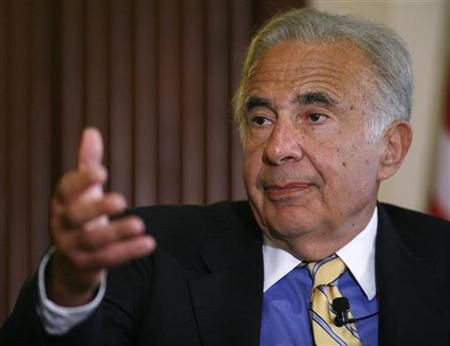Proxy Season 2013: It’s Transocean Vs Activist Investor Carl Icahn As World’s Largest Offshore Driller Preps For Its Annual Meeting

The corporate world is in the midst of its annual proxy season – when top executives meet with their shareholders and votes are cast on issues including management changes, executive pay, or even a company’s stance on human rights and political spending.
Among the more interesting battles being waged this season is a showdown between the world’s largest offshore oil and gas driller, Transocean LTD (NYSE:RIG), and Carl Icahn, one of the better-known so-called activist investors — people who buy significant stakes in companies and then attempt to rally shareholders to pressure boards to change company policies or strategies.
In the days running up to Transocean’s annual general meeting, scheduled for May 17 in Zug, Switzerland, the two sides appear to be at each other’s throats over the size of the annual dividend Icahn pressured the company into reinstating. Transocean, which suspended dividends last year to shore up its cash and avoid an investment downgrade, agreed to an annual payout of $2.24 a share – about $800 million.
Icahn is calling for a dividend of $4 per share, which the company says would cost it about $300 million in added interest and costs related to rolling over its debt obligations. Transocean owes about $1 billion and says its current plan would cost the company less over the next five years.
But Icahn says the company is making “unsupportable claims” about the true cost of paying the larger dividend, and what it really needs is a board shake-up to reverse its “consistent pattern of underperformance.” (The company’s share price has plummeted nearly 64 percent since early 2008 and it's paid only four 79-cent dividends in that time.)
Transocean responded by scorning Icahn’s “poor understanding of the cyclical and capital-intensive nature of the offshore drilling industry,” and released a presentation for its shareholders arguing its case.
Under his dividend demand, Icahn would get $80.6 million this year based on his current stake in the company, estimated at about 20.1 million shares. Under Transocean’s dividend plan he would get $45.1 million.
The 77-year-old billionaire and majority shareholder of Icahn Enterprises (NYSE:IEP) first aimed his sights on Transocean back in January, less than two weeks after the company agreed to pay $1.4 billion in Clean Water Act-related penalties for its role the Deepwater Horizon disaster in the Gulf of Mexico in 2010.
The company’s stock hit a 10-month high after Icahn acquired 1.6 percent of outstanding shares for more than $680 million – a move heralded at the time as a “game changer” for the Vernier, Switzerland-based Transocean.
Game changer indeed.
Since then, Icahn has upped his stake to over 20 million shares, or about 5.6 percent of the company, insisted that it can afford to pay out $4 a share and called for install three hand-picked executives to the board.
Icahn is asking shareholders to vote for his $4 dividend proposal and for the election of his three candidates: Jose Maria Alapont, director of New Jersey-based equipment manufacturer Federal-Mogul Corp. (Nasdaq:FDML); John Lipinski, president, CEO and director of Sugar Land, Texas-based CVR Energy Inc. (NYSE:CVI); and Samuel Merksamer, managing director of Icahn Capital LP, a subsidiary of Icahn Enterprises.
Late last month the proxy advisory firm Institutional Shareholder Services – one of the major providers of guidance regarding shareholder votes – sided with Transocean, recommending the $2.24 dividend. But it also backed Alapont and Merksamer and called for the ouster of Transocean’s Chairman J. Michael Talbert and CEO Robert Sprague.
Another shareholder advisory firm, Glass Lewis & Co., also came out against Icahn’s $4 dividend proposal and recommended that Alapont and Lipinski not be named to the board. It also recommended that Talbert and Sprague be removed.
Lipinski seems like an odd choice for Icahn, who just last year accused the 61-year-old energy sector executive of mishandling CVR Energy by “squandering capital,” “empire building,” trying to “fool all of the people all of the time,” putting in a “dismal performance” as an executive and engaging in a “blatant obfuscation of the facts.” But after acquiring a controlling stake in the Texas refiner and fertilizer manufacturer, Icahn kept Lipinski on his payroll.
Alapont has been “dogged for nearly a decade by a criminal complaint in Spain that accuses him of taking part in a multimillion-dollar fraud against employees of a company where he used to be an executive,” reported the Houston Chronicle late last month.
And Merksamer, a 32-year-old Icahn employee, formerly served on the board of Dynegy Inc., one of Icahn’s past acquisitions. Last year a U.S. Bankruptcy Court examiner concluded that Merksamer led the restructuring of the company “in a manner that would undermine legitimate creditor expectations” and “in a manner that would benefit Dynegy Inc. stockholders unfairly at the expense of creditors.”
Analysts generally view Icahn’s dividend proposal to be ill advised considering the company’s financials. “If the company were to accede to Icahn's demand, it would saddle Transocean with increased interest expense, limit access to capital and might require it to sell assets to meet its liquidity targets,” said Harry Mateer of Barclays Credit Research, as reported in a recent Securities and Exchange Commission filing from Transocean. “Icahn is looking for a relatively quick payday and not looking at the long-term health of the company.”
© Copyright IBTimes 2024. All rights reserved.






















